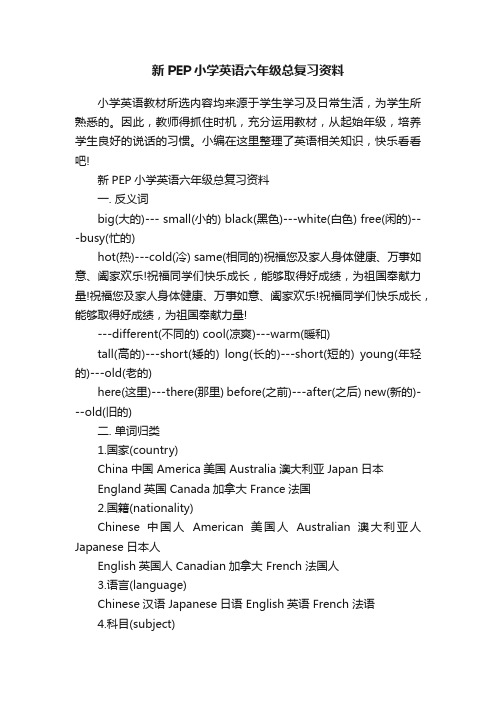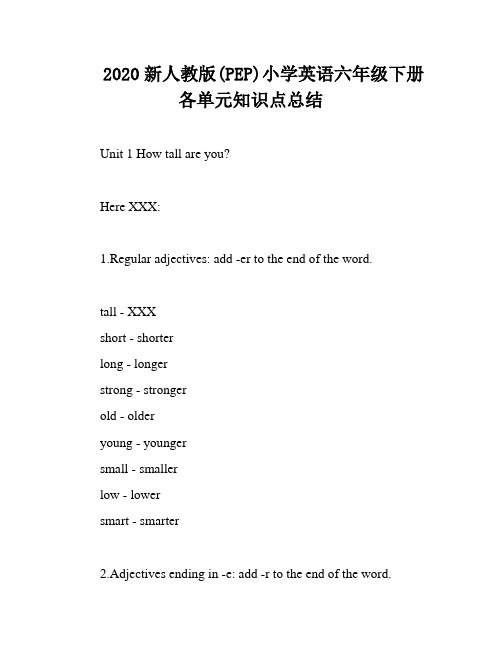PEP小学英语六年级下册总复习资料
- 格式:doc
- 大小:53.50 KB
- 文档页数:7



人教版PEP小学英语六年级下册期中复习知识点小学英语;要有利于学生了解英语国家的文化、习俗,培养他们对异国文化的正确态度。
教材应符合儿童的认知特点,有利于培养他们的学习兴趣与语感。
小编在这里整理了英语相关知识,快乐看看吧!人教版PEP小学英语六年级下册期中复习知识点四会单词:tall—taller更高的short—shorter 更矮的strong—stronger更强壮的old—older 年龄更大的young—younger 更年轻的big—bigger更大的heavy—heavier 更重的long—longer 更长的thin—thinner 更瘦的small—smaller (体型)更小的四会句型:How tall are you? 你有多高?I’m 164 cm tall. 我164 厘米高。
You’re shorter than me. 你比我矮。
You’re 4 cm taller than me.你比我高4厘米。
How heavy are you? 你有多重?I’m 48 kg. 我48千克。
应该掌握的知识点:1、表示两者之间有所比较时,句子中的形容词要用比较级形式。
2、形容词变为比较级的变化规则:(1)一般情况下,在形容词的词尾直接加er。
如: tall—taller short—shorter.(2)以字母e结尾的形容词,在词尾直接加r,如:nice—nicer. late—later (3)以重读闭音节结尾,且结尾只有一个辅音字母的词,先双写这个辅音字母,再加er.如:big—bigger thin—thinner fat—fatter (4)以辅音字母加y结尾的双音节形容词,先变y 为i , 再加er。
如:easy—easier heavy—heavier funny—funnier.形容词比较级的变化口诀:原级变为比较级,通常er加上去。
若是结尾辅元辅,辅音双写要牢记。


六年级下册语法知识点总复习语法知识:英语动词4种时态:1、一般现在时:常与表示程度或频度的词连用,如:often(经常), usually(通常,一般), sometimes(有时), always(总是,一直), never (从不),表示经常性或习惯性的动作,表示现在的特征或状态,表示普遍真理。
用动词原形表示,第三人称单数后,动词要在词尾加s(或es,或变y为i再加es)。
如:I often get up at 7:00.He often gets up at 7:30.2、现在进行时:表示现在或现在这一阶段正在进行的动作。
用am / is / are 加动词ing形式表示,如: What are you doing? I am reading a book. What is he doing? He is singing.3、一般将来时:常与表示将来的时间连用,如:tomorrow , next week , next year 等,表示将要发生的动作或情况。
用am/ is/ are 加going to 形式表示,如:What are you going to do tom orrow? I’m going to ride a horse. 用will 加动词原形表示,如:What will you do next Sunday? I will go shopping. 用am/ is/ are 加动词ing 形式表示,如:What are you doing tomorrow? I’m going bowling.4、一般过去时:经常与表示过去的时间连用, 如: yesterday, last night 等, 表示过去某时发生的动作或情况。
动词要用动词的过去式。
如:Who was first? Ken was first.Where were you yesterday? I was at home.What did you do yesterday? I went to school.形容词的比较级和最高级:1、单音节词:比较级加er, 最高级加est. 如:tall------taller-------- the tallest,He is taller than his brother. Tom is the tallest in his class.2、多音节词和部分双音节词:比较级加more, 最高级加the most. 如:interesting---------more interesting---------the most interesting,Music is interesting subject. P.E. is more interesting than music.. Science is the most interesting subject.形容词变为比较级的变化规则:(1)一般情况下,在形容词的词尾直接加er。

人教版(PEP)小学六年级英语下册知识归纳总结Unit 1 How tall are you?【重点词汇】tall------ taller 高的----更高的short ------ shorter 矮的/短的----更矮的/更短的long----- longer 长的----更长的strong------ stronger 强壮的----更强壮的old ------ older 老的/旧的----更老的/更旧的young------ younger 年轻的----更年轻的small------ small er小的----更小的heavy------heavier 重点----更重的thin ------ thinner 瘦的----更瘦的low------ lower 低地----更低地smart------smarter 聪明的----更聪明的big-----bigger 大的-----更大的happy-----happier 开心的-----更开心的thin-----thinner 瘦的-----更瘦的heavy-----heavier 重的------更重的fat-----fatter 胖的------更胖的funny-----funnier 滑稽的------更滑稽的dinosaur 恐龙hall 大厅than 比both 两个都meter 米kilogram千克;公斤size 号码feet 脚wear 穿countryside乡村shadow 影子;阴影become变成;开始变得【重点句型】⑴问年龄:How old are you?----- I’m _______ (years old). 问身高:How tall are you?---- I’m ______meters tall. 问体重:How heavy are you?---- I’m ______ kilograms .⑵问物品的情况:①How large is your room? 你的房间有多大?It’s __________ m2 (square meters.) 有_______ 平方米。

新PEP小学英语六年级总复习资料小学英语教材所选内容均来源于学生学习及日常生活,为学生所熟悉的。
因此,教师得抓住时机,充分运用教材,从起始年级,培养学生良好的说话的习惯。
小编在这里整理了英语相关知识,快乐看看吧!新PEP小学英语六年级总复习资料一. 反义词big(大的)--- small(小的) black(黑色)---white(白色) free(闲的)---busy(忙的)hot(热)---cold(冷) same(相同的)祝福您及家人身体健康、万事如意、阖家欢乐!祝福同学们快乐成长,能够取得好成绩,为祖国奉献力量!祝福您及家人身体健康、万事如意、阖家欢乐!祝福同学们快乐成长,能够取得好成绩,为祖国奉献力量!---different(不同的) cool(凉爽)---warm(暖和)tall(高的)---short(矮的) long(长的)---short(短的) young(年轻的)---old(老的)here(这里)---there(那里) before(之前)---after(之后) new(新的)---old(旧的)二. 单词归类1.国家(country)China中国 America美国 Australia澳大利亚 Japan日本England英国 Canada加拿大 France法国2.国籍(nationality)Chinese中国人American美国人Australian澳大利亚人Japanese日本人English英国人 Canadian加拿大 French 法国人3.语言(language)Chinese汉语 Japanese日语 English英语 French 法语4.科目(subject)Chinese语文 maths 数学 English 英语 art 美术music音乐 P.E. 体育 computer 电脑 science科学5.星期(week)Sunday星期日 Monday星期一 Tuesday星期二 Wednesday星期三Thursday星期四 Friday星期五 Saturday星期六6.季节(season) spring 春天 summer夏天 autumn秋天 winter 冬天7.月份(month)January一月 February 二 March三月 April四月 May五月 June 六月July 七月August 八月September 九月October 十月November十一月 December十二月8.节日(festival)Spring Festival 春节 Dragon Boat Festival龙舟节 Mid-autumn Festival中秋节New Year’s Day元旦National Day 国庆节Children’s Day儿童节Easter复活节 Halloween万圣节 Christmas 圣诞节Women‘s Day妇女节Teacher’s Day 教师节May Day劳动节9.患病(illness): have a fever发烧hurt疼痛have a cold感冒have a toothache牙疼have a headache头疼have a sore throat喉咙疼10.食物(foods)cake蛋糕 mooncake月饼 dumpling 饺子 bread 面包 pork猪肉fish鱼肉chicken 鸡肉meat肉beef 牛肉egg鸡蛋rice米饭soup汤 salad 沙拉 sandwich三文治 pizza 比萨饼 hamburger 汉堡包 noodles 面条11.时间(time)year年month 月week周date日期day 白天hour 小时morning早上afternoon下午evening晚上yesterday昨天today今天tomorrow明天 next week下个周 last weekend上个周末 last year 去年 the day before yesterday前天 two months ago12.服装(clothes)T-shirt T恤衫 sweater毛衣 coat 大衣 shorts短裤 jeans牛仔裤hat帽子cap帽子 shoe鞋子 sock 短袜 glove 手套scarf 围巾dress连衣裙skirt短裙shirt衬衫13.动物(animals)chicken鸡 duck鸭 goose鹅 dog狗 cat 猫 pig猪 sheep绵羊goat 山羊horse马lion狮子tiger老虎elephant 大象snake蛇kangaroo 袋鼠 monkey 猴子bear 熊 panda熊猫 whale鲸 hen母鸡 mouse老鼠 giraffe长颈鹿 deer鹿14.颜色(colour)grey 灰色 red红色 green绿色 yellow黄色 blue蓝色 white白色 black黑色pink粉红色 orange橙色 brown褐色 purple紫色15.饮料(drinks):juice汁 milk 牛奶 Coke可乐 tea茶 coffee 咖啡 water 水16.数字基数词:one 一 two 二 three三 four四 five五 six 六 seven七eight八 nine 九 ten十 eleven 十一 twelve 十二 thirteen 十三 fifteen 十五 twenty二十thirty 三十 forty 四十 fifty五十 hundred 百 thousand 千 million 百万序数词:first 第一 second第二 third第三 fifth第五 sixth第六seventh第七eighth第八ninth第九twelfth 第十二twentieth 第二十thirtieth第三十17.植物、水果蔬菜tree 树 flower花 grass草 fruit 水果 apple苹果 pear 梨 orange 橙 banana 香蕉 grape葡萄 peach桃子 strawberry草莓watermelon 西瓜pineapple菠萝vegetable蔬菜tomato西红柿potato马铃薯onion洋葱 cabbage卷心菜 green beans豆角18.职业(jobs)worker工人 farmer农民 doctor医生 nurse护士 teacher 教师driver司机 cook厨师 police officer警察 singer歌唱家cleaner清洁工postman邮递员fisherman 渔夫pilot飞行员coach教练businessman商人19、自然界sun太阳 moon月亮 star星星 sky天空 river江河 lake 湖 sea大海 hill山mountain山脉 snow雪 wind风 cloud云 rain雨20、天气(weather)sunny阳光明媚的windy有风的cloudy多云的snowy下雪的rainy下雨的 dry干燥的wet湿的 warm暖的 cool凉爽的 cold冷的 hot热的21、人体部分head头 hair头发 hand手 face脸 eye眼 ear耳朵 nose鼻子 leg 腿 foot脚22、人people人们 man男人 woman妇女 child小孩 grandparents祖父母 parents父母 father父亲 mother母亲 sister姐妹 brother兄弟cousin堂兄 uncle舅舅、叔叔 aunt阿姨23、文具pen钢笔 pencil铅笔 rubber橡皮 ruler尺 knife小刀 map地图dictionary字典24、建筑与房屋部分bedroom卧室living-room客厅kitchen厨房study书房washroom 卫生间 garden花园 office办公室 bank银行 school学校hospital医院cinema电影院park公园zoo动物园shop商店bookstore书店supermarket超市library图书馆museum博物馆post office邮局TV station电视台hotel宾馆wall墙floor 地板window 窗 door门25.日用品lamp台灯 light灯 telephone电话 clock钟 fridge冰箱 cup杯glass玻璃杯 box盒子 bowl碗26.方位词left左 right右 in front of 在前面 behind后面 near附近 next to与相邻27.家具bed床 desk书桌 table桌子 chair椅子 shelf 书架sofa沙发28.餐食meal一顿饭 breakfast早餐 lunch 午餐 dinner晚餐29.交通工具bus公共汽车 train火车 car小汽车 bike自行 ship轮船 boat小船 plane飞机 ferry轮渡 subway地铁 taxi出租车30.外貌tall高的 short矮的 fat胖的 thin 瘦的healthy健康的 nice好看的 beautiful(pretty)美丽的strong强壮的 old 老的 young 年轻的 heavy重的31.性格clever(smart)聪明的active活跃的quiet安静的shy 害羞的hard-working勤奋的strict严厉的kind和蔼的polile 有礼貌的helpful乐于助人的能干的四.动词词组go shopping去购物 go fishing去钓鱼 go boating去划船 go swimming 去游泳go skiing 去滑雪 go skating去溜冰 go for a walk 去散步 go hiking去远足 go on a picnic去野餐 go camping去野营 go to the cinema 去看电影 go to bed去睡觉 go to school去上学 go to work 去上班 go back回来 go out出去play football 踢足球play basketball打篮球play table tennis(play ping-pong)打乒乓球play badminton 打羽毛球 play the piano 弹钢琴 play games 玩游戏 write a letter写信listen to music听音乐 watch TV 看电视 see a film 看电影 take photos(pictures)照相clean the room打扫房间 wash clothes洗衣服 draw a picture 画画 have breakfast 吃早餐 have lunch 吃午餐 have dinner 吃晚饭do housework 做家务do my homework做作业have a Chinese lesson 上语文课take a dancing class上舞蹈课do morning exercises晨练pick apples 摘苹果plant trees种树wait for等候make cakes 做蛋糕 make the bed 铺床make a card 做卡片look for 寻找 put on穿上 wake up醒来 get up 起床五. 介词短语a pair of 一双 a lot of 许多 on the farm在农场 in front of在…前面 in the sky 在空中 on foot步行 in the morning 在早上in the afternoon在下午 in the evening在晚上 at night在晚上 at school 在学校 at home在家六、易错词汇1. a, an的选择: 元音字母开头的单词用an,辅音字母开头的单词用a.2. am , is , are的选择: I 用 am , you 用 are. 第三人称单数用is , 复数都用are.3. have , has 的选择: 表示某人有某物。

一、日常招呼用语:Hello! I’m Kate. 你好!我是Kate.What’s your name?你叫什么名字?My name’s Kate.我叫Kate。
See you tomorrow. Bye bye. Goodbye.再见Good morning. 上午好Good afternoon.下午好Good evening.晚上好Nice to meet you!见到你很高兴(第一次见面)Nice to meet you,too!见到你我也很高兴。
How are you?你好吗?Fine, thank you.我很好,谢谢。
(You’re welcome.不用谢)打电话:Can I speak to Amy?我能和Amy说话吗?This is Amy speaking. 我就是AmyWho’s that?你是谁?二、介绍人或物This is Kate 这是KateIs this Kate?这是Kate 吗?Yes,she is./No, she isn’t.Who’s that man?那个人是谁?He is my father.他是我爸。
What’s your mother?你妈是干什么的?(What does your mother do?)She is a worker.她是个工人。
Where are you from?你来自哪里?I’m from China.我来自中国。
What’s this?这是什么?This is my bedroom?这是我的卧室Is this your bedroom?这是你的卧室吗?Yes, it is ./ No, it isn’t.What’s that?那是什么?That is the room.那是电视房。
Is that the TV room? 那是电视房吗?Yes, it is /No, it isn’t.What are they?他们是什么?What are these?这些是什么?What are those?那些是什么?They are horses.他们是马。

Book 6B Unit 1 How tall are you?一、词汇tall ----- taller 高的----更高的than比short ----- shorter 矮的/短的----更矮的/更短的cm 厘米Hm9N1hZLXYTzK3a9rJPYE8uVW797is6PtLxh6HyOzO3h7V6rm5long ------ longer 长的----更长的meter 米7i8rXPkzky2h9fN96N6SKfulelKjqNRZJfpPtcuHGOv5eHJIoq形容词strong------ stronger 强壮的----更强壮的ton 吨adj. old ------ older 老的/旧的----更老的/更旧的size 号码young------ younger 年轻的-----更年轻的feet 脚small------ smaller 小的----更小的think 想wear 穿辅+元+辅--------双写最后一个辅音字母+er others even 甚至big-----bigger 大的-----更大的tail 尾巴97Ifb7TYmRxj2jlTJW3ZuDm31xdEfVjFautASZIs5KLPzTkg95thin-----thinner瘦的-----更瘦的little 小的fat-----fatter 胖的------更胖的lobster 龙虾shark 鲨鱼辅音字母+y -----改y为i +er deep 深的happy-----happier 开心的-----更开心的seal 海豹nmcCRK70U4xMNo4SsYp30H4ywHRV619XAYBYnaVmIqVZ7lyvgmheavy-----heavier 重的------更重的squid 鱿鱼funny-----funnier 滑稽的------更滑稽的sperm whale抹香鲸killer whale虎鲸二、重点句型⑴问年龄,身高,体重等How old are you? How tall are you? How heavy are you?---- I’m _______ (years old). ------ I’m ______ cm tall. ------- I’m ______ kg .⑵问物品的情况:① How large is your room? 你的房间有多大?It’s __________ m2 (square meters.) 有_______ 平方米。


一、找出Ⅱ栏中与I栏中相对应的答语,把标号填入题前括号内。
原创不容易,为有更多动力,请【关注、关注、关注】,谢谢!古之学者必严其师,师严然后道尊。
欧阳修I II( )1. How heavy are you? A.They are size 39.( )2. How tall are you? B.I’m 15 years old.( )3. How old are you? C.I’m 45kg.( )4. What size are your shoes? D.I’m 158cm tall.( )5. How long is your bed? E.It is 200cm.二、从Ⅱ栏中找出适合I栏的答语,将其标号填入括号内。
I II( )1. What does he do? A.She is going to the cinema.( )2. What does she do? B.He is old and fat.( )3. What is it like? C.She is a dentist.( )4. What is he like? D.He is a doctor.( )5. Where is she going? E.It’s long and black.三、从B栏中选出与A栏相对应的答句,将选项填在题前的括号内。
A B( )l. How old are you? A. I’m not sure. Perhaps fort or fifty. ( )2. Did you watch TV yesterday? B. I’m from China.( )3. How far is the supermarket from here? C. We’re going to have a picnic. ( )4. What’s your plan for the weekend? D. No.1 was busy with my homework. ( ). Can I help you? E. It’s about three o’clock.( )6. Where are you from? F. It’s about 3 kilometres away. ( )7. What time is it now? G. I’m fifeen.( )8. Which skirt do you like, the blue one or th red one? H. OK. Here you are. ( )9. May I use your calculator? I. I’d like to buy two boxes of moon cakes. ( )10. Howmany teachrs are there in your school? J. The red one. 四、从Ⅱ栏中找出I栏的最佳答语。

2020新人教版(PEP)小学英语六年级下册各单元知识点总结Unit 1 How tall are you?Here XXX:1.Regular adjectives: add -er to the end of the word.tall - XXXshort - shorterlong - longerstrong - strongerold - olderyoung - youngersmall - smallerlow - lowersmart - smarter2.Adjectives ending in -e: add -r to the end of the word.large - largerlate - latersimple - simplersafe - safer3.Adjectives XXX: double the final consonant and add -er.big - biggerXXX - XXXfat - fattersad - sadderhot - hotterwet - wetter4.Adjectives ending in -y: change the -y to -i and add -er.happy - happierheavy - XXXXXX - funnierangry - angrierXXX - XXXwindy - windierbusy - busierearly - earlierXXX:dinosaur。
hall。
than。
both。
meter。
kilogram。
size。
feet。
wear。
countryside。
shadow。
e.Here XXX:1.Asking about age。
height。
weight。
etc.How old are you?How tall are you?How heavy are you?I am (age) years old。




小学英语语法及习题一、名词复数规则1.一般情况下,直接加-s,如:book-books,bag-bags,cat-cats,bed-beds2.以s.x.sh.ch结尾,加-es,如:3.以4.以5eI_________him_________this___________her______ watch_______child_______photo________diary______ day________foot________book_______dress________ tooth_______sheep______box_______strawberry_____ thief_______yo-yo______peach______sandwich______man______woman_______paper_______??????juice___________ water________milk________rice__________tea__________ 二、一般现在时一般现在时基本用法介绍【No.1】一般现在时的功能或"-es"一般现在时的变化1.be动词的变化。
否定句:主语+be+not+其它。
如:Heisnotaworker.他不是工人。
一般疑问句:Be+主语+其它。
如:-Areyouastudent?-Yes.Iam./No,I'mnot.特殊疑问句:疑问词+一般疑问句。
如:Whereismybike?2.行为动词的变化。
否定句:主语+don't(doesn't)+动词原形(+其它)。
如:动词12.以s.x.sh.ch.o结尾,加-es,如:guess-guesses,wash-washes,watch-watches,go-goes3.以“辅音字母+y”结尾,变y为i,再加-es,如:study-studies 一般现在时用法专练:一、写出下列动词的第三人称单数drink________go_______stay________make________look_________have_______pass_______????carry____ come________?????watch______plant_______fly________ study_______brush________do_________????teach_______ 二、用括号内动词的适当形式填空。

Unit 4 Then and now一、单词dining hall 饭厅grass草坪gym 体育馆ago 以前cycling 骑自行车运动go cycling去骑自行车ice-skate滑冰badminton羽毛球运动二、短语…years ago (几)年前…months ago(几个)月前last year 去年last month上个月play badminton 打羽毛球三、句子1.There was no library in my old school.我以前的学校里没有图书馆。
2.Tell us about your school, please.请给我们讲讲您的学校吧!3.How do you know that?你是怎么知道的?4.There was no computer or Internet in my time.我那时候没有电脑也没有网络。
5.Before,I was quiet. Now I am very active in class.我以前很安静。
现在我在课堂上很活跃。
6.I was short, so I couldn't ride my bike well.我以前个子小,自行车骑得不好。
7.Now I go cycling every day.现在我天天骑车。
四、作文: Last weekendI was busy last weekend. Saturday morning , I did my homework . Then, I visited my grandparents. In the afternoon, I went swimming with my friends. Sunday morning, my parents and I went to a park. We went boating and flew kites. It was a happy weekend.六年级下册单元知识点第四单元四会单词:learn Chinese—learned Chinese学汉语sing and dance—sang and danced 唱歌和跳舞eat good food—ate good food吃好吃的食物take pictures—took pictures 照相climb—climbed 爬have—had buy presents—bought presents买礼物row a boat—rowed a boat 划船see elephant—saw elephant 看大象go skiing—went skiing 去滑雪go ice-skating—went ice-skating 去滑冰how怎么,如何get—got 到达last上一个的,仅余的,留在最后的四会句型:Where did you go on your holiday? 你去哪里度假了?I went to Xinjiang. 我去新疆了。

pep小学英语六年级下册知识点总结PEP小学英语六年级下册是学生英语学习过程中的重要阶段,涵盖了丰富的词汇、语法知识以及语言技能。
以下是对PEP小学英语六年级下册知识点的总结:词汇学习1. 日常生活词汇:学习与日常生活相关的词汇,如家庭成员、日常活动、食物、衣物等。
2. 学校生活词汇:掌握与学校生活相关的词汇,如学科名称、学校设施、学习用品等。
3. 节日和文化:了解不同节日的英文表达,如春节、圣诞节等,以及相关的文化习俗词汇。
4. 自然现象和环境:学习描述自然现象和环境的词汇,如天气、季节、动植物等。
语法知识1. 时态:重点掌握一般现在时、一般过去时和一般将来时的用法。
2. 名词:学习名词的单复数形式,以及名词所有格的构成。
3. 代词:掌握人称代词、物主代词、指示代词和疑问代词的用法。
4. 形容词和副词:学习形容词和副词的比较级和最高级形式,以及它们的用法。
5. 动词:学习动词的基本形式,以及不规则动词的变化规则。
6. 句型结构:熟悉简单句、并列句和复合句的基本结构。
语言技能1. 听力:通过听力练习,提高对英语口语的理解能力。
2. 口语:通过角色扮演、情景对话等方式,锻炼口语表达能力。
3. 阅读:阅读各种类型的英文材料,如故事、短文、诗歌等,提高阅读理解能力。
4. 写作:练习写日记、书信、小短文等,培养书面表达能力。
文化意识1. 中西文化差异:了解中西方文化在节日庆祝、饮食习惯等方面的差异。
2. 跨文化交流:学习如何在不同文化背景下进行有效沟通。
学习策略1. 记忆技巧:运用联想记忆、图像记忆等方法,帮助记忆单词和短语。
2. 复习计划:制定合理的复习计划,定期复习所学知识,避免遗忘。
3. 合作学习:与同学一起学习,通过小组讨论、合作完成任务等方式,提高学习效率。
总结PEP小学英语六年级下册的学习不仅仅是对语言知识的积累,更是对语言运用能力的培养。
通过系统地学习和复习,学生可以更好地掌握英语知识,提高英语应用能力,为今后的英语学习打下坚实的基础。

⼈教版⼩学PEP英语五六年级下册知识点归纳Unit 1 My day⼀、重点词汇。
五、重点句型。
1、询问别⼈什么时候做某事的句型及回答。
句型结构:问:When do you+动词短语原形+其他?(你/你们什么时候做某事?)答:I/We(+频度副词)+动词短语原形+at+具体时间(我/我们通常在⼏点做某事。
)例:问:When do you go to bed?(你什么时候上床睡觉?)答:I go to bed at 9:00p.m (我晚上9点上床睡觉。
)注意:当主语是第三⼈称单数(he,she,it,单个⼈名或单数名词)时,助动词do要变成does,句型结构是:When does+主语(第三⼈称单数)+动词短语原形+其他?2、询问别⼈周末做什么的句型及回答。
句型结构:问:What do you do on theweekend?(你周末做什么?)答:I(+频度副词)+动词(短语)+其他。
例:问:What do you do on theweekend?(你周末做什么?)答:I usually read books. (我通常看书。
)注意:当主语是第三⼈称单数(he,she,it,单个⼈名或单数名词)时,助动词do要变成does,句型结构是:What does+主语(第三⼈称单数)+do+on the weekend?六、四会句⼦:When do you finish class in the morning ? 你们上午的课到⼏点结束?We finish class at 1 o’clock . 我们⼀点钟结束上午的课。
What do you do on the weekend ? 你周末做什么?I often watch TV and play ping-pong with my father . 我经常看电视,也常和我爸爸⼀起打乒乓球。
七、语⾳:cl /kl/ clean clock class cleverpl /pl / plate eggplant please playUnit 2 My favourite season三、重点句型1、询问别⼈天⽓怎么样的句型及回答。
学道教育·小学英语六年级总复习资料一.反义词big(大的)--- small(小的)black(黑色)---white(白色)free(闲的)---busy(忙的)hot(热)---cold(冷)same(相同的)---different(不同的)cool(凉爽)---warm(暖和)tall(高的)---short(矮的)long(长的)---short(短的)young(年轻的)---old(老的)here(这里)---there(那里)before(之前)---after(之后)new(新的)---old(旧的)二.单词归类1.国家(country)C hina中国A merica美国A ustralia澳大利亚J apan日本E ngland英国C anada加拿大F rance法国2.国籍(nationality)C hinese中国人A merican美国人A ustralian澳大利亚人J apanese日本人E nglish英国人C anadian加拿大F rench 法国人3.语言(language)Chinese汉语Japanese日语English英语French 法语4.科目(subject)Chinese语文maths 数学English 英语art 美术music音乐P.E. 体育history 历史science科学5.星期(week)Sunday星期日Monday星期一Tuesday星期二Wednesday星期三Thursday星期四Friday星期五Saturday星期六6.季节(season)spring 春天summer夏天autumn秋天winter冬天7.月份(month)January一月February 二月March三月April四月May五月June 六月July 七月August 八月September 九月October 十月November十一月December十二月8.节日(festival)Spring Festival 春节Dragon Boat Festival龙舟节Mid-autumn Festival中秋节New Year’s Day元旦National Day 国庆节Children’s Day儿童节Easter复活节Halloween万圣节Christmas 圣诞节Women’s Day妇女节Teacher’s Day 教师节May Day劳动节9.患病(illness): have a fever发烧hurt疼痛have a cold感冒have a toothache牙疼havea headache头疼have a sore throat喉咙疼10.食物(foods)cake蛋糕mooncake月饼dumpling 饺子bread 面包pork猪肉fish鱼肉chicken 鸡肉meat肉egg鸡蛋sandwich三文治pizza 比萨饼hamburger 汉堡包noodles 面条11.时间(time)year年month 月week周date日期day 白天hour 小时morning早上afternoon下午evening晚上yesterday昨天today今天tomorrow明天last year去年12.服装(clothes)T-shirt T恤衫sweater毛衣coat 大衣shorts短裤jeans牛仔裤hat帽子cap帽子shoe鞋子sock 短袜13.动物(animals)chicken鸡duck鸭goose鹅dog狗cat 猫pig猪sheep绵羊goat 山羊horse马lion狮子tiger老虎elephant 大象snake蛇kangaroo 袋鼠monkey 猴子bear 熊panda熊猫whale鲸frog青蛙mouse老鼠giraffe长颈鹿deer鹿14.颜色(colour)grey 灰色red红色green绿色yellow黄色blue蓝色white白色black黑色pink粉红色orange橙色brown褐色purple紫色15.饮料(drinks)juice汁milk 牛奶coke可乐tea茶coffee 咖啡soup 汤16.数字基数词:one 一two 二three三four四five五six 六seven七eight八nine 九ten十eleven 十一twelve 十二thirteen 十三fifteen十五twenty二十thirty 三十forty 四十fifty五十hundred 百thousand 千million百万序数词:first 第一second第二third第三fifth第五sixth第六seventh第七eighth第八ninth第九twelfth 第十二twentieth 第二十thirtieth第三十17.植物、水果tree 树flower花seed种子grass草vegetable蔬菜tomato西红柿potato马铃薯fruit 水果apple苹果pear 梨orange橙banana 香蕉grape葡萄peach桃子18.职业(jobs)worker工人farmer农民soldier士兵doctor医生nurse护士teacher 教师driver司机cook厨师policeman警察19、自然界sun太阳moon月亮star星星sky天空river江河lake 湖sea大海hill山mountain山脉snow雪wind风cloud云rain雨20、天气(weather)sunny阳光明媚的windy有风的cloudy多云的snowy下雪的rainy下雨的dry干燥的wet湿的warm暖的cool凉爽的cold冷的hot热的21、人体部分head头hair头发hand手face脸eye眼ear耳朵nose鼻子leg腿foot脚22、人people人们man男人woman妇女child小孩grandparent祖父母parent父母father父亲mother母亲sister姐妹brother兄弟cousin堂兄uncle舅舅、叔叔23、文具pen钢笔pencil铅笔rubber橡皮ruler尺knife小刀map地图dictionary字典24、建筑与房屋部分bedroom卧室living-room客厅kitchen厨房garden花园office办公室bank银行school学校hospital医院cinema电影院park公园park动物园shop商店bookstore书店post office邮局TV station电视台hotel宾馆wall墙floor 地板window 窗door门25.日用品camera 照相机telephone电话clock钟lamp灯fridge冰箱cup杯glass玻璃杯box盒子bowl碗26.方向left左right右east东south南west西north北27.家具bed床desk书桌table桌子chair椅子shelf架子28.餐食meal一顿饭breakfast早餐lunch 午餐dinner晚餐29.交通工具bus公共汽车train火车car小汽车bike自行ship轮船boat小船plane飞机30.外貌tall高的short矮的fat胖的healthy健康的good-looking 好看的beautiful美丽的strong强壮的old 老的young 年轻的heavy重的四.动词词组go shopping去购物go fishing去钓鱼go boating去划船go swimming 去游泳go skiing 去滑雪go skating去溜冰go for a walk 去散步go to the cinema 去看电影go to bed去睡觉go to school去上学go to work去上班go back回来go out出去play football 踢足球play basketball打篮球play table tennis打乒乓球play badminton 打羽毛球play the piano 弹钢琴play games玩游戏write a letter写信listen to music听音乐watch TV 看电视see a film 看电影take photos照相clean the room打扫房间wash clothes洗衣服draw a picture画画have breakfast 吃早餐have lunch 吃午餐have dinner 吃晚饭do housework 做家务do my homework做作业have a Chinese lesson 上语文课take a message传递信息turn on打开take exercise锻炼take medicine服药take photos照相plant trees种树pick up捡起wait for等候五.介词短语a pair of 一双 a lot of 许多on the farm在农场in front of在…前面in the sky 在空中look for寻找put on穿上wait for等待wake up醒来on foot步行in the morning 在早上in the afternoon在下午in the evening在晚上at night在晚上at school 在学校at home在家六、易错词汇1. a, an的选择: 元音字母a,e.i.0.u开头的单词用an,辅音字母开头的单词用a.2. am , is , are的选择: 单数用is , 复数用are. I 用am , you 用are.3. have , has 的选择: 表示某人有某物。
单数用has , 复数用have. I ,you 用have .4. there is, there are 的选择:表示某地有某物,某人。
单数用there is , 复数用there are.5. some, any 的选择:肯定句用some, 疑问句和否定句用any.6. 疑问词的选择: what (什么) who (谁) where (哪里) whose (谁的) why(为什么)when(什么时候)which(哪一个)how old (多大) how many(多少)how much(多少钱)七、比较级:比较级与than连用I’m taller than you. (我比你高。
)My hair is longer than yours. (我的头发比你的长。